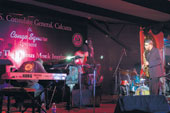 |
 |
| (From top) The jazz concert in progress at Dalhousie Institute; Kenny Garrett at the event. Pictures by Rashbehari Das |
Eat your hearts out, Delhi and Bangalore. You didn’t get to hear a world-class musician who played only in Mumbai and Calcutta last week! Kenny Garrett’s touring quartet touched down at Dalhousie Institute on Friday as part of a tour by the Black Entertainment Channel and Thelonious Monk Institute of Jazz, thanks to the US Consulate General and Congo Square.
Not for some time has an American performer of such stature ? though relatively unknown in these parts ? come to town. Dig this: if you accept that Downbeat magazine is the arbiter of jazz, Garrett is ranked second among all alto saxophonists in its latest polls. I found on my recent research trip to the US involving contemporary American live performance that mention of him arises there in the same breath now as living legend Phil Woods.
That is how good Garrett has become since he played under Miles Davis in the late 1980s on records such as Amandla. At 44 years old, he is young by jazz standards. He has led his own band since the 1990s, and smashed into the musical firmament with a trio of consecutive brilliant albums in 1995-97. He dedicated Triology (1995) to the great tenors Sonny Rollins and Joe Henderson, paying fit homage to them. Then he did the same to the master John Coltrane on Pursuance (1996), interpreting Trane’s scores with such power and intensity that many critics claimed they heard the same fire in him. It is my favourite Garrett CD till date, made even richer by the presence of guitarist Pat Metheny. For the fine-tuned ear, a stimulating exercise is to compare Garrett’s versions of Coltrane’s Giant Steps on Triology and Pursuance. The following year (1997), he collected his own compositions on Songbook, proving that he could write sophisticated originals himself. Those of you floored by his concert can pick up any of these import CDs: satisfaction guaranteed. Among his latest albums, I like Standard of Language (2003) the best.
Garrett, whose e-mail ID is “Real Kenny G” to avoid confusion with that popular saccharine pretender Kenny G, joins many contemporaries in underplaying the label of jazz. He feels it raises associations of esoterica, thereby alienating potential converts. “According to me,” he says, “I just play music.” As laconic in conversation as on his albums ? which contain no liner notes or introductory/explanatory material ? he spoke to me for just a few minutes while autographing my copies of two of his CDs. Understandably, for he lets his music speak for itself.
And what music! The set kicked off with two numbers from Standard of Language. The first, XYZ, resembled Sehwag opening the innings. It wasted no time in warming up, giving the spectators no chance to catch their breath. Garrett soared into full throttle with his alto screaming, shrieking and squealing in a blistering attack. The peppy Chief Blackwater continued in the same vein, displaying his full arsenal of technical abilities.
Then came a change of pace on Wayne’s Thang, obviously a tribute to tenorist Wayne Shorter, off Triology. Laying into a funky melodic groove powered by drummer Ronald Brunner, Garrett had the ground rocking as he seduced the audience into clapping to the beat. Several times the band stopped as if the cut had finished, only to start up again, surprising everyone. On the fourth track, Sing a Song of Song from Songbook, Garrett taught us a simple phrase to sing along in the closest that he came to a lyrical ballad.
The mood changed completely after this, as he switched to soprano sax for what he calls an “Asian Medley”, of three Japanese tunes (Akatonbo, Arriang and Tsu Ba San Wo Kudasai), arranged by him most delicately. Almost as good on the smaller instrument, he caressed it into soft, barely audible notes pointed at the earth, or walked outside microphone range up front blowing directly at the audience, unamplified.
The gig ended with just two vocal pieces featuring Lisa Henry scatting away joyfully on Song 8 and Happy People. The last was really a dance jam as Garrett beckoned to listeners to take the floor, and the security guards held hands, not to jig, but nervously to cordon off the stage from undesirable people. The standards of creative improvisation dropped dramatically as the priority shifted to shaking limbs, the music to repeated rhythmic riffs, and the scene to a Goa-like rave, but hey, no complaints ? if this brings young fans to hear more jazz, Garrett has done it a service. His hip-hop voiceover invoking Calcutta may have attracted even more.
The sextet seemed quite taken aback that Calcuttans didn’t want the party to end at 10 pm, and they could have continued the otherwise short two-hour show. Brunner and bassist Kristopher Funn told me that Calcutta was far more receptive than Mumbai, where the audience sat tight with a stiff upper lip. That surprised me ? I would have expected the opposite. But even Garrett acknowledged that Calcuttans were “relaxed”, and Indians in general compared to listeners elsewhere.
Very unfortunately, young Nicholas Payton, rated fifth-best trumpeter by Downbeat, couldn’t make it to India, having hurt his lips, disabling his embouchure. And pianist Carlos McKinney suffered from a bad cough and cold, sounding slightly off-colour. But Brunner was a veritable dynamo, so charged up that at one point one of his sticks flew out of his hand and hit the ceiling. When I asked him how that happened, he disingenuously said he couldn’t remember anything. Meanwhile Funn appeared awed by the proceedings, but was actually in full control of bass throughout.
Let’s applaud American Centre heartily for returning to their old tradition of bringing us class acts. May we have more?










